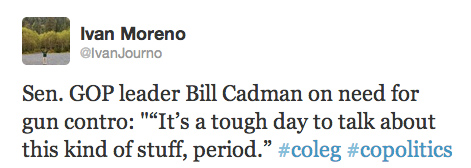Thanks For Playing, Open Government Institute of Colorado
 During the recently-concluded election season, we spoke a few times about a new right-leaning “nonpartisan government watchdog” operating out of the offices of the arch-conservative Independence Institute. The Open Government Institute of Colorado made news this spring after filing a complaint regarding now Rep.-elect Dianne Primavera over a fundraiser invitation that mistakenly included the name of former Rep. Anne McGihon, alleging “Ms. Primavera solicited unlawful contributions from lobbyists.”
During the recently-concluded election season, we spoke a few times about a new right-leaning “nonpartisan government watchdog” operating out of the offices of the arch-conservative Independence Institute. The Open Government Institute of Colorado made news this spring after filing a complaint regarding now Rep.-elect Dianne Primavera over a fundraiser invitation that mistakenly included the name of former Rep. Anne McGihon, alleging “Ms. Primavera solicited unlawful contributions from lobbyists.”
Not long after this complaint was filed, we were leaked hidden-camera video of OGI director Jessica Peck speaking at a luncheon of the Colorado Republican Business Coalition in honor of Rep. Mike Coffman. In this video, Peck makes absolutely no secret about OGI’s partisan goals and origins, and even claims to be working on projects to “benefit you,” meaning Rep. Coffman, “in your endeavors in November.” The video is now the subject of an IRS complaint alleging a violation of OGI’s 501(c)(3) “nonpartisan nonprofit charity” tax status.
Now, it won’t surprise our readers to learn that IRS investigations take a very long time to proceed, and as of this writing we don’t know the status of that complaint. But this week, a judgment was handed down in the case filed by OGI. And it’s a judgment that Ms. Peck surely isn’t happy about. Excerpted, read it all here:
This matter is a complaint pursuant to Colo. Const. art. XXVIII, sec. 9(2)(a) and the Fair Campaign Practices Act (“FCPA”), Section 1-45-101, C.R.S. et seq. Jessica K. Peck, Esq., appeared on behalf of the Complainant and Mark G. Grueskin, Esq., appeared on behalf of the Respondent…
Western United Realty, supra, at 1066 approves of the discussion of attorney fees in International Technical Instruments, Inc. v. Engineering Measurements Co., 678 P.2d 558 (Colo. App. 1983) and notes specifically the fact that the party against whom attorney fees were assessed in that case “conducted no discovery whatsoever” and “nominally attempted to establish its … claim at trial.” This description equally applies to the Complainant’s efforts in this case. [Pols emphasis]
The ALJ therefore concludes that claim 1 also lacked substantial justification in that it was substantially frivolous, substantially groundless, and substantially vexatious…
The case for attorney fees in relation to claim 2 is clear cut; no effort was made to present evidence in support of this claim. “[A] claim … is groundless if the allegations in the complaint … are not supported by any credible evidence at trial.” Western United Realty, Inc. v. Isaacs, 679 P.2d 1063, 1069 (Colo. 1984). In Colorado Citizens for Ethics in Government v. Commission for the American Dream, 187 P.3d 1207, 1219-1220 (Colo. App. 2008) the Court upheld an ALJ’s imposition of attorney 8 fees on a party in a campaign finance case where the party dismissed a claim at hearing. At 1220 the Court cited Engel v. Engel, 902 P.2d 442, 446 (Colo. App. 1995) and Bilawsky v. Faseehudin, 916 P.2d 586, 590 (Colo. App. 1995) for the proposition that an action may be substantially groundless even though dismissed on the morning of trial.
In this case, the Complainant only acquiesced, through counsel, to the Respondent’s motion to dismiss claim 2 after the presentation of his evidence. Claim 2 lacked substantial justification in that it was substantially frivolous, substantially groundless, and substantially vexatious. The Complainant never voluntarily dismissed the claim (a basis not to assess attorney fees per Section 13-17-102 (5)). Section 13- 17-102 (6) is inapplicable as the Complainant was represented…
It is therefore the Agency Decision of the Secretary of State that no violation of Section 1-45-105.5(1)(a)(I) has been proven. It is furthermore the Agency Decision that the Complainant and the Complainant’s counsel are jointly and severally liable per Section 1-45-111.5(2) for the $17,712.38 amount. [Pols emphasis] Complainant’s counsel only is responsible for the $400 of attorney fees related to the additional expense on December 11, 2012.
In short, the OGI’s case against Rep.-elect Primavera was so bad that the judge has awarded about $18,000 in attorney’s fees to McGihon and her lawyer Mark Grueskin. Short of frog-marching somebody, we really don’t know how much more of a repudiation can be legally delivered in a case like this. After every right-wing mouthpiece in the state took up the cause, berating reporters into covering it, today you know the case against Primavera was so “frivolous, groundless, and vexatious” that OGI has been ordered to pay for wasting everyone’s time.
We’ve heard rumors that OGI Colorado has already, for all practical purposes, shut down operations. So hopefully there’s still $18,000 in the bank to collect–we’d hate to see the private citizen who nominally filed the OGI’s complaint get stuck with the tab.
For our part, the thoroughly delicious irony is entertainment enough: thousands in donations to OGI, meant to “help Mike Coffman,” instead going to Mark Grueskin. And it’s a lesson to Republicans, licking their wounds after yet another losing election cycle in Colorado, envious of the “Colorado Model” of Democratic-aligned activist and message groups that OGI was meant to help replicate for the GOP. OGI may have been set up as the right’s Colorado Ethics Watch, but it filled the role more like Bizarro Superman. Suffice to say, this is not the path to victory.



